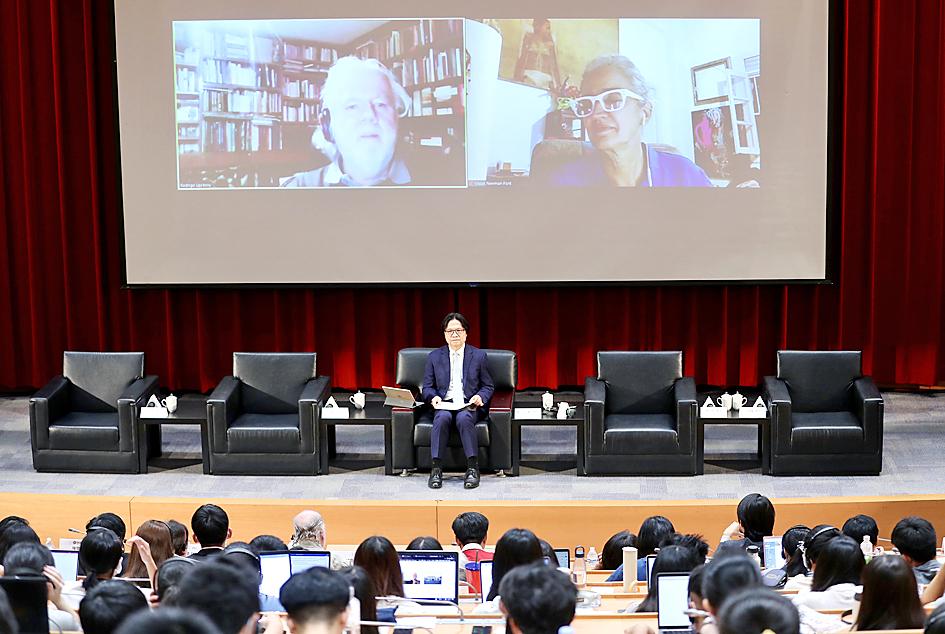Three legal advocacy organizations that won this year’s Tang Prize for their significant contributions to the rule of law yesterday discussed the challenges they face in tackling economic, environmental and political issues.
At the Tang Prize Masters’ Forum in Rule of Law, representatives from the Bangladesh Environmental Lawyers Association (BELA), Colombia-based Dejusticia and Lebanon-based The Legal Agenda addressed an audience in Taipei through videoconferencing.
Syeda Rizwana Hasan, chief executive of BELA, which promotes environmental justice and the development of sound environmental jurisprudence, said that her organization faces challenges from international financial institutions, large corporations and the government.

Photo: CNA
“Corporate interests often take over public interests, and the state loses its entity as a regulator and sides so much with the corporation that you can’t really differentiate which one is the state and which one is the corporation,” she said.
These interests greatly impact non-governmental organizations (NGOs), as 430 environmental and human rights defenders in Bangladesh were killed last year while fighting against mining projects or defending the rights of indigenous communities, Hasan said.
“Authoritarian regimes are increasingly branding NGOs as foreign agents, enemies of the state and anti-development elements. They are trying to criminalize our entity and our functioning, they are trying to seize powers so they can assess our performances and delicense us if we go against their developmental narratives,” Hasan said.
Rodrigo Uprimny Yepes is cofounder of Dejusticia, which is focused on rule of law issues such as racial and sex discrimination.
He said that many NGOs must find a way to obtain financial stability without losing their independence.
Samer Ghamroun, a cofounder and board member of The Legal Agenda, which promotes judiciary independence and the defense of vulnerable groups, said that although religious equality is guaranteed in Lebanon, many other individual rights are not.
“So religious equality coexists with social economic inequalities, huge social economical inquiries and lack of respect for individual rights,” Ghamroun said.
Yeh Jiunn-rong (葉俊榮), a professor at National Taiwan University and chair of the Tang Prize selection committee for the rule of law, moderated the forum, which was organized by the Tang Prize Foundation and the university’s College of Law.

A preclearance service to facilitate entry for people traveling to select airports in Japan would be available from Thursday next week to Feb. 25 at Taiwan Taoyuan International Airport, Taoyuan International Airport Corp (TIAC) said on Tuesday. The service was first made available to Taiwanese travelers throughout the winter vacation of 2024 and during the Lunar New Year holiday. In addition to flights to the Japanese cities of Hakodate, Asahikawa, Akita, Sendai, Niigata, Okayama, Takamatsu, Kumamoto and Kagoshima, the service would be available to travelers to Kobe and Oita. The service can be accessed by passengers of 15 flight routes operated by

MORE FALL: An investigation into one of Xi’s key cronies, part of a broader ‘anti-corruption’ drive, indicates that he might have a deep distrust in the military, an expert said China’s latest military purge underscores systemic risks in its shift from collective leadership to sole rule under Chinese President Xi Jinping (習近平), and could disrupt its chain of command and military capabilities, a national security official said yesterday. If decisionmaking within the Chinese Communist Party has become “irrational” under one-man rule, the Taiwan Strait and the regional situation must be approached with extreme caution, given unforeseen risks, they added. The anonymous official made the remarks as China’s Central Military Commission Vice Chairman Zhang Youxia (張又俠) and Joint Staff Department Chief of Staff Liu Zhenli (劉振立) were reportedly being investigated for suspected “serious

ENHANCING EFFICIENCY: The apron can accommodate 16 airplanes overnight at Taoyuan airport while work on the third runway continues, the transport minister said A new temporary overnight parking apron at Taiwan Taoyuan International Airport is to start operating on Friday next week to boost operational efficiency while the third runway is being constructed, the Ministry of Transportation and Communications said yesterday. The apron — one of the crucial projects in the construction of the third runway — can accommodate 16 aircraft overnight at the nation’s largest international airport, Minister of Transportation and Communications Chen Shih-kai (陳世凱) told reporters while inspecting the new facility yesterday morning. Aside from providing the airport operator with greater flexibility in aircraft parking during the third runway construction,

American climber Alex Honnold is to attempt a free climb of Taipei 101 today at 9am, with traffic closures around the skyscraper. To accommodate the climb attempt and filming, the Taipei Department of Transportation said traffic controls would be enforced around the Taipei 101 area. If weather conditions delay the climb, the restrictions would be pushed back to tomorrow. Traffic controls would be in place today from 7am to 11am around the Taipei 101 area, the department said. Songzhi Road would be fully closed in both directions between Songlian Road and Xinyi Road Sec 5, it said, adding that bidirectional traffic controls would